Consuming a modified Mediterranean ketogenic diet reverses the peripheral lipid signature of Alzheimer's disease in humans
- PMID: 39779882
- PMCID: PMC11711287
- DOI: 10.1038/s43856-024-00682-w
Consuming a modified Mediterranean ketogenic diet reverses the peripheral lipid signature of Alzheimer's disease in humans
Abstract
Background: Alzheimer's disease (AD) is a major neurodegenerative disorder with significant environmental factors, including diet and lifestyle, influencing its onset and progression. Although previous studies have suggested that certain diets may reduce the incidence of AD, the underlying mechanisms remain unclear.
Method: In this post-hoc analysis of a randomized crossover study of 20 elderly adults, we investigated the effects of a modified Mediterranean ketogenic diet (MMKD) on the plasma lipidome in the context of AD biomarkers, analyzing 784 lipid species across 47 classes using a targeted lipidomics platform.
Results: Here we identified substantial changes in response to MMKD intervention, aside from metabolic changes associated with a ketogenic diet, we identified a a global elevation across all plasmanyl and plasmenyl ether lipid species, with many changes linked to clinical and biochemical markers of AD. We further validated our findings by leveraging our prior clinical studies into lipid related changeswith AD (n = 1912), and found that the lipidomic signature with MMKD was inversely associated with the lipidomic signature of prevalent and incident AD.
Conclusions: Intervention with a MMKD was able to alter the plasma lipidome in ways that contrast with AD-associated patterns. Given its low risk and cost, MMKD could be a promising approach for prevention or early symptomatic treatment of AD.
Plain language summary
Previous research has suggested that different diets might alter the risk of a person developing Alzheimer’s disease. We compared the blood of 20 older adults, some with memory impairment, following a change in diet. The two diets we compared were the Modified Mediterranean Ketogenic and American Heart Association Diets. The changes that were seen following consumption of the Mediterranean-ketogenic diet were the opposite to those typically seen in people with Alzheimer’s disease or those likely to develop it. These data suggest adopting this diet could potentially be a promising approach to slow down or prevent the development of Alzheimer’s disease. Aligning these results with previous larger clinical studies looking at lipids, we identified that these changes were opposite to what was typically seen in people with Alzheimer’s disease or those likely to develop it. As this diet was generally safe and inexpensive, this intervention could be a promising approach to mitigate some risk Alzheimer’s disease and help with early symptoms.
© 2025. The Author(s).
Conflict of interest statement
Competing interests: Dr. Kaddurah-Daouk is an inventor on a series of patents on use of metabolomics for the diagnosis and treatment of CNS diseases and holds equity in Metabolon Inc., Chymia LLC and PsyProtix. JK holds equity in Chymia LLC and IP in PsyProtix and is cofounder of iollo. JK holds equity in Chymia LLC and IP in PsyProtix and is cofounder of iollo. Dr. Zetterberg has served at scientific advisory boards and/or as a consultant for Abbvie, Acumen, Alector, Alzinova, ALZPath, Annexon, Apellis, Artery Therapeutics, AZTherapies, CogRx, Denali, Eisai, Nervgen, Novo Nordisk, Optoceutics, Passage Bio, Pinteon Therapeutics, Prothena, Red Abbey Labs, reMYND, Roche, Samumed, Siemens Healthineers, Triplet Therapeutics, and Wave, has given lectures in symposia sponsored by Cellectricon, Fujirebio, Alzecure, Biogen, and Roche, and is a co-founder of Brain Biomarker Solutions in Gothenburg AB (BBS), which is a part of the GU Ventures Incubator Program (outside submitted work). All other authors declare no competing interests.
Figures
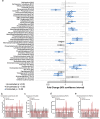
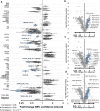
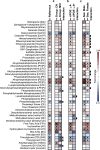

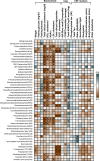
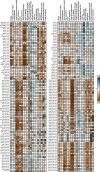
References
-
- Gaugler, J. et al. Alzheimer’s disease facts and figures. ALZHEIMERS DEMENTIA18, 700–789 (2022). - PubMed
-
- Mullard, A. Landmark Alzheimer’s drug approval confounds research community. Nature594, 309–310 (2021). - PubMed
-
- Couzin-Frankel J. FDA approves new antibody to slow Alzheimer’s disease, even as safety concerns linger. In. Science (2023).
Grants and funding
- R01 AG046171/AG/NIA NIH HHS/United States
- U19 AG063744/AG/NIA NIH HHS/United States
- R01AG046171, RF1AG051550, RF1AG057452, R01AG059093, RF1AG058942, U01AG061359, U19AG063744/U.S. Department of Health & Human Services | National Institutes of Health (NIH)
- UL1 TR001420/TR/NCATS NIH HHS/United States
- RF1 AG059093/AG/NIA NIH HHS/United States
- U01 AG061359/AG/NIA NIH HHS/United States
- RF1 AG057452/AG/NIA NIH HHS/United States
- P30 AG072947/AG/NIA NIH HHS/United States
- R01 AG069901/AG/NIA NIH HHS/United States
- P30 AG013319/AG/NIA NIH HHS/United States
- P30 AG049638/AG/NIA NIH HHS/United States
- #DAOU16AMPA/Foundation for the National Institutes of Health (Foundation for the National Institutes of Health, Inc.)
- RF1 AG058942/AG/NIA NIH HHS/United States
- RF1 AG051550/AG/NIA NIH HHS/United States
LinkOut - more resources
Full Text Sources
Research Materials

